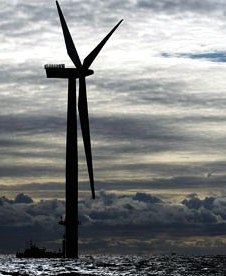 Technology
Technology

CUC looks for green energy
 (CNS): Grand Cayman’s sole power supplier is inviting proposals from qualified parties to supply up to 13 megawatts (MW) of sustainable energy. CUC has put out an invitation for “expressions of interest and proposals” for the financing, construction, ownership and operation of renewable energy generation facilities. The firm said Friday that it has been monitoring the status of several alternative power sources for over a decade but the cost had “prohibited adoption”. Given the current cost of oil prices, however, alongside advancements in renewable energy in technologies, the firm said it believes that there are vendors in the market now that can provide greener power that may provide savings to the customer.
(CNS): Grand Cayman’s sole power supplier is inviting proposals from qualified parties to supply up to 13 megawatts (MW) of sustainable energy. CUC has put out an invitation for “expressions of interest and proposals” for the financing, construction, ownership and operation of renewable energy generation facilities. The firm said Friday that it has been monitoring the status of several alternative power sources for over a decade but the cost had “prohibited adoption”. Given the current cost of oil prices, however, alongside advancements in renewable energy in technologies, the firm said it believes that there are vendors in the market now that can provide greener power that may provide savings to the customer.
“Renewable energy could provide several benefits to Cayman, including lower emissions, price stability, and perhaps lower cost. CUC is hoping to identify viable Renewable Energy projects by the end of 2011,” the power firm said in a release.
The request for preliminary proposals was circulated last week and CUC is seeking expressions of interest from entities with a track record in financing, designing, constructing and operating comparable size renewable energy generation projects. CUC said it will evaluate proposals on both technical and financial merits, with 70 percent based on the ultimate price of generating the alternative energy.
“It is envisioned that the Investor would become an Independent Power Producer (IPP) that will enter into a Power Purchase Agreement (PPA) with CUC for the supply of electricity from the alternative energy generators,” the invitation states and explains that the successful partner will need to secure a generating licence from the ERA.
CUC said that feasibility studies for any energy source being proposed are the responsibility of the IPP but CUC has 12 months of wind study data from two locations that will be made available to qualified investors.
The need to find an alternative to the current situation of Cayman’s total dependence on diesel has been a long time coming. CUC had asked for invitations to tender back in 2008 with the goal of establishing a wind farm. Despite going some way down the road with that project, efforts were thwarted when the most suitable location for the turbines was identified in East End but was also selected as the site for government’s Doppler radar, bringing the two projects into conflict.

United Airlines switches to iPads in cockpit
 (CNET): United Airlines has announced its cockpits will go paperless by swapping out printed flight manuals in favor of Apple's iPad. As part of the swap, the carrier is giving 11,000 iPads to all United and Continental pilots. The iPads are loaded with Jeppesen Mobile FliteDeck, an app that contains navigational charts and local airport information. United estimates that the change from paper will save it 326,000 gallons of jet fuel a year, based on the paper the iPads are replacing. "Each iPad, which weighs less than 1.5 pounds, will replace approximately 38 pounds of paper operating manuals, navigation charts, reference handbooks, flight checklists, logbooks and weather information in a pilot's flight bag," the company said in a statement.
(CNET): United Airlines has announced its cockpits will go paperless by swapping out printed flight manuals in favor of Apple's iPad. As part of the swap, the carrier is giving 11,000 iPads to all United and Continental pilots. The iPads are loaded with Jeppesen Mobile FliteDeck, an app that contains navigational charts and local airport information. United estimates that the change from paper will save it 326,000 gallons of jet fuel a year, based on the paper the iPads are replacing. "Each iPad, which weighs less than 1.5 pounds, will replace approximately 38 pounds of paper operating manuals, navigation charts, reference handbooks, flight checklists, logbooks and weather information in a pilot's flight bag," the company said in a statement.
"A conventional flight bag full of paper materials contains an average of 12,000 sheets of paper per pilot."
United says it began doling out iPads to pilots a few weeks ago and that all its pilots will have them by the end of the year. Both Delta Airlines and Alaska Airlines began testing iPads for navigational purposes earlier this year as part of a trial program. Executive Jet Management, a unit of NetJets, announced in February that it had gained approval from the Federal Aviation Administration to use Jeppesen'sapp as well.

Internet use surges in Caribbean region
(CNS): According to an assessment of global internet figures by News Americas Caribbean internet use is growing rapidly. Internet World Statistics show there has been a growth in users logging on to the web by over 1,000 percent in just a decade. As of March this year use in the Caribbean had grown by over 1,763 percent since 2000. The Dominican Republic leads the way with 4 million users while Jamaica is second with 1.5 million. However, out of 41 million people, the Caribbean only has over 10 million people online or just over 25 percent of the population while out of 155 million Central American nationals over 42 million or 27 percent are on the web.
In Central America, Mexico led the way with over 34 million of its 113 million residents on the web. Guatemala and Costa Rica lagged way behind with just over 2 million of their population being able to log on.
In South America, Brazil leads with over 75 million online but that’s in a population of over 203 million. Argentina was second with over 27 million or some 66 percent of its population on the World Wide Web while Columbia came in third with over 22 million or just over 50 percent of its residents online.

Twitter beats Facebook for financial service firms
 (FT.Com): Twitter, the microblogging service, has now surpassed Facebook, the social networking market leader, as the most popular third-party network employed by financial services companies, according to a survey conducted by Corporate Insight, a specialist market research firm. At the start of August, just over two-thirds of the 85 companies across the banking, credit cards, brokerage and asset management sectors tracked by Corporate Insight had a presence on Twitter, up from 57 per cent 10 months earlier. Over the same time period, the percentage of financial services firms with Facebook pages increased from 56 to 59 per cent.
(FT.Com): Twitter, the microblogging service, has now surpassed Facebook, the social networking market leader, as the most popular third-party network employed by financial services companies, according to a survey conducted by Corporate Insight, a specialist market research firm. At the start of August, just over two-thirds of the 85 companies across the banking, credit cards, brokerage and asset management sectors tracked by Corporate Insight had a presence on Twitter, up from 57 per cent 10 months earlier. Over the same time period, the percentage of financial services firms with Facebook pages increased from 56 to 59 per cent.
“In our opinion, Facebook is more of a relationship-driven community, whereas Twitter is more content-driven,” said Alan Maginn, senior analyst at Corporate Insight. “Facebook is a more challenging environment for businesses because, in order to be successful, they must foster a relationship with their fans. With Twitter, they can concentrate more on the value of the content they produce.”

UK Government e-petition website launched
 (The Guardian): The Commons Speaker, John Bercow, has emerged as a strong supporter of government plans to allow electronic petitions as a way of shaping the parliamentary agenda and increasing public engagement. A government e-petition website will go live on Thursday, showing petitions that have been accepted for consideration for debate in the Commons. The leader of the house, Sir George Young, has saidpetitions that garner more than 100,000 signatures should warrant consideration for debate. Bercow is understood to be flexible about how parliament should be seen to be responding to an e-petition garnering big support.
(The Guardian): The Commons Speaker, John Bercow, has emerged as a strong supporter of government plans to allow electronic petitions as a way of shaping the parliamentary agenda and increasing public engagement. A government e-petition website will go live on Thursday, showing petitions that have been accepted for consideration for debate in the Commons. The leader of the house, Sir George Young, has saidpetitions that garner more than 100,000 signatures should warrant consideration for debate. Bercow is understood to be flexible about how parliament should be seen to be responding to an e-petition garnering big support.
He does not necessarily think every issue should be considered at a full- length debate, but might simply require a minister to come to the house and answer a question on the issue. The e-petition page on the government's Directgov website will show the e-petitions that have been accepted so far.
It is widely expected that supporters of capital punishment, immigration controls, withdrawal from Europe and opposition to green taxes will initially dominate. An e-petition will only be allowed to stay on the website for a year, and duplicates will not be allowed.

Twitter valued at $8bn after large investment
 (The Guardian): Twitter, the microblogging website that lets users tweet messages of 140 characters or less, is now worth $8bn (£4.9bn). The firm's new price tag comes after a $400m investment in the loss-making venture from serial social media investor DST Global. Twitter is now nominally worth about the same as rating agency Moody's, which had revenues of $1.2bn in the first six months of 2011 and is nearly as valuable as Marks & Spencer.The huge valuation reflects high expectations for the company. Confirming the investment, Twitter also announced that its users now send 200m tweets a day, up from 65m a year ago.
(The Guardian): Twitter, the microblogging website that lets users tweet messages of 140 characters or less, is now worth $8bn (£4.9bn). The firm's new price tag comes after a $400m investment in the loss-making venture from serial social media investor DST Global. Twitter is now nominally worth about the same as rating agency Moody's, which had revenues of $1.2bn in the first six months of 2011 and is nearly as valuable as Marks & Spencer.The huge valuation reflects high expectations for the company. Confirming the investment, Twitter also announced that its users now send 200m tweets a day, up from 65m a year ago.

UK sails ahead in offshore wind power generation
 (Guardian): The UK has sailed ahead in offshore wind power generation in the past six months, building more offshore windfarms than any other country in the world, and accounting for almost all of the turbines erected in European waters this year. Of only 108 offshore turbines built around Europe's coastline from January to June, a whopping 101 were built around the UK, with only six built in Germany, and a single one in Norway, according to estimates published on Wednesday by the trade body European Wind Energy Association (EWEA). Chris Huhne, energy and climate change secretary, told the Guardian the figures showed how fast the UK was moving in renewable power.
(Guardian): The UK has sailed ahead in offshore wind power generation in the past six months, building more offshore windfarms than any other country in the world, and accounting for almost all of the turbines erected in European waters this year. Of only 108 offshore turbines built around Europe's coastline from January to June, a whopping 101 were built around the UK, with only six built in Germany, and a single one in Norway, according to estimates published on Wednesday by the trade body European Wind Energy Association (EWEA). Chris Huhne, energy and climate change secretary, told the Guardian the figures showed how fast the UK was moving in renewable power.
"The UK is the undisputed home of offshore wind energy. Our natural resource and competitive advantage mean we have the biggest market in the world. We're blowing away the competition," he said. "It's part of the low-carbon revolution that's under way in the UK, bringing jobs and growth in new industries and building us a future less exposed to volatile global energy prices."

Spelling errors cost millions in internet sales
 (BBC): An online entrepreneur says that poor spelling is costing the UK millions of pounds in lost revenue for internet businesses. Charles Duncombe says an analysis of website figures shows a single spelling mistake can cut online sales in half. Duncombe says when recruiting staff he has been "shocked at the poor quality of written English". Sales figures suggest misspellings put off consumers who could have concerns about a website's credibility, he says.The concerns were echoed by the Confederation of British Industry (CBI), whose head of education and skills warned that too many employers were having to invest in remedial literacy lessons for their staff.
(BBC): An online entrepreneur says that poor spelling is costing the UK millions of pounds in lost revenue for internet businesses. Charles Duncombe says an analysis of website figures shows a single spelling mistake can cut online sales in half. Duncombe says when recruiting staff he has been "shocked at the poor quality of written English". Sales figures suggest misspellings put off consumers who could have concerns about a website's credibility, he says.The concerns were echoed by the Confederation of British Industry (CBI), whose head of education and skills warned that too many employers were having to invest in remedial literacy lessons for their staff.
Duncombe, who runs travel, mobile phones and clothing websites, says that poor spelling is a serious problem for the online economy.
"Often these cutting-edge companies depend upon old-fashioned skills," says Duncombe. And he says that the struggle to recruit enough staff who can spell means that this sector of the economy is not as efficient as it might be.
Figures from the Office for National Statistics published last month showed internet sales in the UK running at £527m per week.

Twitter helps researchers measure public health
(CBSNews): Twitter is a powerful tool that's been used for everything, from broadcasting quirky cat tweets to assisting Middle East revolutions. Now the micro-blogging service is being used to check the health of its users. Michael J. Paul and Mark Dredze of John Hopkins University published a study on how to data mine Twitter in order to extract "public health information." The two computer scientists propose a method of measuring tweets that includes using filters and algorithms to analyze what's ailing people, how they are discussing their illnesses and user feedback, all within Twitter's ecosystem.
The research can be found in PDF form with details and the formulas used to determine a tweet's value. Essentially, our complaints on Twitter are used as metrics to determine the general health of the population at large. After studying 1.5 million health-related tweets between May 2009 and October 2010, they found that many Twitter users chose the wrong drugs to tackle common ailments.
Competition uncovers antique telephone.
(CNS): The owner of an antique phone dated to 1891 received a brand new Blackberry Bold recently as the winner of LIME’s local photo competition to commemorate World Telecommunications and Information Society Day. Entrants were asked to send in photos of their oldest telecommunications equipment. Julie Hutton, MarketingManager LIME Cayman Islands said there were plenty of old phones Rajesh Khillawa’s was the winner.
“We had lots of entries with everything from very old landline phones to some of the earlier mobile phones. We would like to congratulate Rajesh Khillawa for his winning entry which dates back to 1891,” she said.
The purpose of World Telecommunication and Information Society Day (WTISD) is to help raise awareness of the possibilities that the use of the Internet and other information and communication technologies (ICT) can bring to societies and economies, as well as of ways to bridge the digital divide. the day is commemorated on 17 May which marks the anniversary of the signing of the first International Telegraph Convention and the creation of the International Telecommunication Union.
More winning photos can be seen at http://www.facebook.com/time4LIME